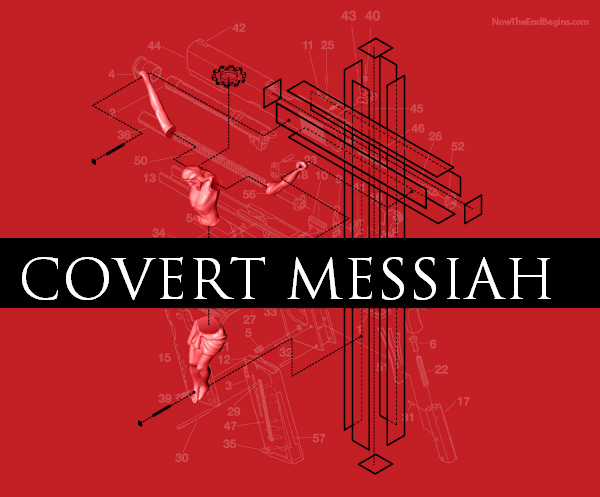“Covert Messiah” is the latest theory delving into alternatives to the New Testament understanding of the origins of Christianity. Joseph Atwill explains that Christianity was originally an elaborate hoax created by the Roman government as a means of pacifying the usually tumultuous land of 1st century Judea. He writes, “Jesus Christ is a fabricated cover story for an Imperial psychological warfare operation born out of the First Jewish-Roman War in the first century.”[1] Based on his studies of Josephus’ “The Jewish Wars”, Atwill argues that the gospel accounts were constructed on the same pattern and specifically designed by Rome to introduce a new, pacifistic religious system. If the Jews accepted Jesus as their Messiah then it would have, apparently, made governing them a lot easier. As far-fetched as it seems, the story has gained a bit of traction around the web, and I know that at least a few biblical scholars have received emails from concerned individuals. Will there be a response to this latest attack on the origins of Christianity?[2]
It is certainly possible to present a full scale response to this latest theory, and some have probably already done so. The question, however, is, it even possible to write an adequate response? I see at least three problems.
The first is that if the response is going to be read (or heard) by the same target audience as the original material then it must be presented at the “popular level.” But any response of this kind will be immediately dismissed as “unscientific” or “faith-based.” After all, this is not the first time that the historical realities of Christian origins have been challenged, and you are sure to find thousands, if not millions, of people who are basically convinced that Jesus never existed, or that Jesus never rose from the dead. If you directed these individuals to popular level books dealing with these issues they would no doubt be brushed aside by the vast majority. On the other hand, a full-scale scholarly response would simply go unread. In fact, this is already the case. N.T. Wright’s series on Christian Origins and the Question of God has had three volumes in print for 30 years now, and more specific to the topic is C. Kavin Rowe’s article “The Grammar of Life” or book World Upside Down.[3] If these materials were carefully considered, it seems to me that Atwill’s argument would simply fall to pieces. Of course, the person who is going to be convinced by this “History Channel” style exposé probably won’t follow it up by reading a few thousand pages of carefully researched and argued counter-arguments. Practically speaking, a response is immediately in a “damned if you do, damned if you don’t” scenario.
The second problem is that the way conspiracy theories are generally constructed makes them un-falsifiable. A few years ago I had an interesting roommate who was very, very convinced that the world was being run by shape-shifting reptilian aliens. They controlled everything, so of course it was next to impossible to get “real” information (except on YouTube of course). World leaders don’t look like aliens? Of course not, they are shape-shifters. These aliens haven’t killed or censored those who have discovered their secret? Of course not, they rely on making them look absurd. In fact, the very absurdness of the claim proves its veracity! The aliens are behind everything. Exchange “the aliens” for “the Masons” or “the Illuminati” or “the Romans” and you get the same result. If everything is a Roman conspiracy then everything can be explained within that narrative. It’s un-falsifiable, but only if you assume that it is true to begin with. In other words, the conclusion is the argument’s most compelling piece of evidence. In terms of the arguments logic this is a big problem.
Finally, there is the problem that Christianity is, for many good reasons, understood by many as a tool of the state used for precisely the purpose outlined by Atwill. We owe this understanding to Marx and the fact that, at least in Western Europe and North America, this is arguably how Christianity has functioned. But the historical reality of early Christianity is quite different: the basic claim throughout the New Testament is very consistently that Jesus is Lord of the whole world, and as every victim and citizen of the Roman Empire knew quite well: there is only one lord and his name is not Jesus. The early church was persecuted for making the strange, radical claim the Jesus, not Caesar, was really in charge. Persecution of the same degree does not occur in the Christianized West, but this is largely due to the fact that Christianity has been seen as totally compatible with the interests of these empires. There is a type of Christian expression that can claim without embarrassment and with a straight face that, “America is/was a Christian nation.” And while no one in the West has ever been thrown to lions for their faith, many have experience sharp disapproval when, for instance, they refuse to pledge allegiance to a flag or support the use of violence for the acquisition and/or protection of national wealth. Theologically speaking, it is difficult to accept the interpretation of Christianity, at least that described in the NT, as basically a tool of state control.
So we can summarize these three problems in this way: First, the practical problem of what people will actually listen to read, second, the logical problem of how to work through theories like Atwill’s, and third, the theological problem of how Atwill understands early Christianity to have functioned. It is my hope that pointing out these issues with crafting a response to “Covert Messiah” becomes itself a type of response. As always, thoughts, questions, and comments are very welcome.
[1] “About,” Covert Messiah, October 17, 2013, accessed October 17, 2013, http://www.covertmessiah.com/.
[2] One biblical scholar, Larry Hurtado, has in fact written a bit of a response, but unfortunately it falls heavily into a category of argument I have written about elsewhere (cf. http://www.thetwocities.com/biblical-studies/the-bullying-consensus/). Hurtado’s response can be found here: http://larryhurtado.wordpress.com/2013/10/11/flimflam-of-the-month-covert-christianity/
[3] C. Kavin Rowe, “The Grammar of Life: The Areopagus Speech and Pagan Tradition”, New Testament Studies 57, no. 1 (2011); C. Kavin Rowe, World Upside Down: Reading Acts in the Graeco-Roman Age, (Oxford: Oxford University Press, USA, 2010)





7 Comments
Leave your reply.